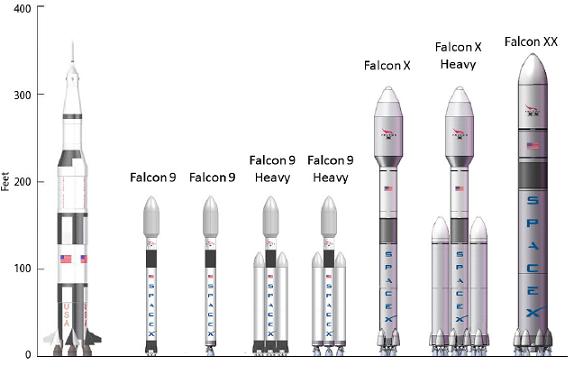This article is more than 1 year old
Elon Musk vs NASA and the US rocket industry - ding ding!
Seconds out for the space fight of the century
The bell has gone for Round One in the epic bare-knuckle battle over the future of US manned space exploration, which is set to run for years and to devolve into a dirty fight indeed.

Recycled Apollo ... or something new? Could be more than a NASA job's worth.
Yesterday, NASA selected 13 companies for "potential contract awards ... evaluating heavy-lift launch vehicle system concepts, propulsion technologies and affordability". It is these 13 companies who will contend over the next five years to design and then (for some of them) build the new NASA heavy-lift rocket which is to carry US astronauts on missions beyond low Earth orbit for the first time since the 1970s.
In the blue corner we have famous PayPal nerdwealth hecamillionaire Elon Musk and his upstart startup rocket company SpaceX, pretty much the only serious contender among the so-called "new space" wave of firms often founded with internet money. Other ink-drenched but largely insubstantial ventures - Armadillo Aerospace, Blue Origin, Virgin Galactic et al - are typically aiming for suborbital performance at best: but SpaceX has already achieved full-fat orbital delivery capability.
In the many red corners of this metaphorical polygonal boxing ring, we have the established US space heavyweights, the companies which built the current launchers used by NASA, and the US military (including the Shuttle) – who had expected to build the next generation under the previous President's ambitious "Constellation" plan for a manned return to the Moon followed up in time by boots on Mars.
Constellation, which would have used Ares I man-launcher and Ares V heavy-lift rockets based on tech from the Shuttle and Apollo and delivered by the established players, would have been very expensive. Congress eventually declined its funding. Thus the incoming Obama administration was compelled to think of a new plan.
In outline, this plan has seen most of Constellation binned - in particular the new Ares launch rockets. Plans for near-term Moon return have also been nixed. Instead, Obama has said that NASA will now choose a new heavy lift rocket design for deep space missions in 2015. He has also supplied more funds for commercial schemes under which cargoes - and, in time, crews - can be flown to low orbit (to the International Space Station for the foreseeable future) on privately built and operated rockets. The normal NASA model as seen in the Apollo and Shuttle eras meant that huge contractor firms would build the spacecraft and then other, also huge, partly-NASA workforces would operate them.
Elon Musk has always argued that the established model results in wildly excessive costs, which in effect is why the US space programme - the big end so far of humanity's efforts in space - has struggled to achieve much of note since the end of the Apollo era and its lavish funding. He says this is specifically why he founded SpaceX.
Musk considers that if it weren't for NASA and its many copiously-staffed campuses and facilities across the USA (as well as other bloated, inefficient workforces providing decades-old Shuttle and Apollo-derived rockets which are naturally expensive to use), access to space could be a lot, lot cheaper. His SpaceX firm uses new tech developed specifically to be cheap and reliable, and has only recently passed the 1,000-employees mark.
